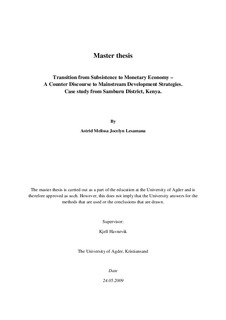Transition from subsistence to monetary economy- a counterdiscourse to mainstream development strategies : case study from Samburu distict, Kenya
Master thesis
Permanent lenke
http://hdl.handle.net/11250/135169Utgivelsesdato
2009Metadata
Vis full innførselSamlinger
Sammendrag
The present thesis is a case study with aim of performing an investigation of the process
unfolding from the subsistence to a monetary economy. It is juxtaposed to counter
mainstream development strategies amongst the Samburu people in Samburu District, Kenya.
The objective has been trying to analyze the perceptions, ideas, transition- stages and patterns
amongst the Samburu people as well as the reveal negative consequences that can occur from
implementation of development and modernization strategies.
The Samburu people are classified as an indigenous population (IPACC 2007). Indigenous
people around the world have often one unfortunate thing in common; negative outcomes
from modernization and assimilation processes. While the Samburu people at the first glance
appears to be a rather static and intact example of preservation of indigenous cultures, it is of
course not true as all cultures have traces and evidence of changes occurring in their
livelihoods and traditions (Spencer 1997). Since they usually have a different holistic
worldview than the majority of the world’s population, including development organizations,
it is important to have bear in mind while creating and implementing development strategies
in such communities.
Through a thorough chapter of theoretical framework and literature review, the common
discourses on indigenous people, pastoralism and development are discussed. Theories and
concepts forming the basis for this analysis are also examined in the same chapter.
Common researches on pastoralist communities have mainly concluded that they are
maintaining a practice which leads to environmental degradation (Spencer 1997; McCabe
1997). But and loss is also one of the main issues proven negative among indigenous people.
Populations relying on economic and social systems founded on natural resources are indeed
more fragile to development initiatives and land loss than those who mainly rely on purchased
goods (Survival international 2007).
The thesis reveals that a historically forced first stage of transition to monetary economy
indeed changed the Samburu people. By being introduced to development strategies that are
founded on a monetary economy, many of have become marginalized in terms of a monetary
poverty which often bear negative consequences such as prostitution, alcoholism, crime and
violence. While solely depending on pastoralism and subsistence economy, these outcomes
were rarely occurring.
Five different locations in Kenya have been subject to this research, four of them located in
Samburu District; Nairimirimo, Maralal, Barsaloi and Archers Post while the fifth research
areas was Mtwapa, Mombasa. A mixed method consisting of both qualitative and quantitative
methodology has been applied in the thesis.
The chapter on empirical findings and analysis is divided into four main sections. They
analyse and discuss various mainstream development strategies and modernization processes
which have had negative results on the Samburus but commonly are irreversible. Mainstream development strategies in this thesis are associated with sedentary issues, urbanization,
agricultural expansion, education, commercialization, business entrepreneurship and tourism.
KEY WORDS: PASTORALISM, DEVELOPMENT CRITIQUE, INDIGENOUS PEOPLE, SAMBURU.
________ _______ _______ ______ _______ _______ ______ _______ _______ ______ _______ ______ _______ _______ ______ _______ _______ ______ _______ _______ ______ _______ ______ _______ _______ ______ _______ _______ ______ _______ _______ ______ _______ ______ _______ _______ ____ _________ _______ _______ ______ _______ _______ ______ _______ _______ ______ _______ ______ _______ _______ ______ _______ _______ ______ ______
Beskrivelse
Masteroppgave i development management- Universitetet i Agder 2009
